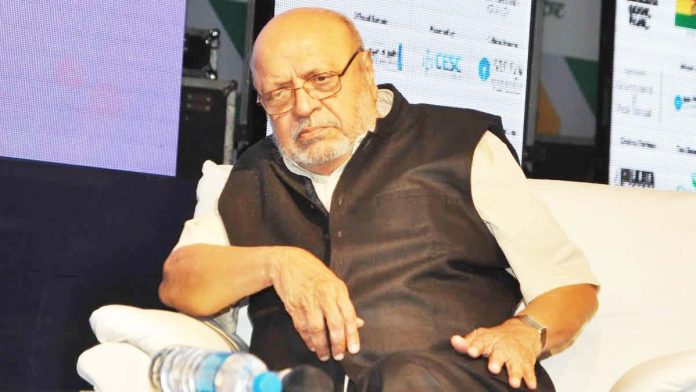Tirthankar Mitra
Even at the risk of uttering a cliché, filmmaker Shyam Benegal was in a class of his own. A path-breaker, he took his audience to places where they had never been before. And this is no sweetener to enhance the reputation of a man who is no more.
Who else but Benegal could crowd-fund a film like ‘Manthan’, themed on the milk cooperative movement in Gujarat, and make a film like ‘Mandi’ based on the trials and tribulations of the inmates of a house of ill-fame?
Benegal focussed his lens, a critical one on power structures in the rural landscape. His films were on the lives of marginalised people, which mainstream Hindi films did not dare touch.
Shyam Benegal was a storyteller whose script was enlivened by a touch of social realism. And it so happened, many of his celebrated films and documentaries were game-changers.
His directorial style brought out an advertising man’s gift of being economical, yet impactful. The audience’s reception to ‘Ankur’ in 1974, depicting the sexual exploitation of a lower-caste woman, is a case in point.
Released a year before ‘Zanjeer’, giving Amitabh Bachchan his first hit, was not at all in competition with ‘Ankur’. The audience most of whom had little idea about the distinction between a commercial and an art-house film, flocked to see both at the theatres, only vaguely aware that both the films portrayed protest in their unique ways.
Of late, the filmmaker had not been keeping well, but his admirers hoped he would recover and direct one more film that would take a dig at the Establishment, making the audience think and chuckle on their way home from the theatres.
It was not to be. But before Benegal journeyed to the arena of shadows, he left an impressive body of work, which stands out from the song and dance and action of the average Hindi film genre, and whose makers crow about the fact that they are hits.
One of the propellers of parallel cinema in India, there came a time in Benegal’s filmmaking career when he effortlessly crossed over the boundaries separating potboilers from art-house films.
But that took its own time coming and thankfully not too soon as ‘Ankur’, a film in which Shabana Azmi made her debut, and a movie one is not tired of watching over and over again.
Box office acceptance was very much a part of Benegal’s films. Be it a documentary like ‘Bose: the forgotten Hero’, one the best cinematic works on the life of Subhas Chandra Bose or a modern-day tale of a family of industrialists ‘Kalyug’ based on Mahabharata or ‘Junoon’, which was based on a Ruskin Bond short story ‘A Flight of Pigeons’, a take on the Great Indian Uprising of 1857.
It is a coincidence Shashi Kapoor, an out and out commercial Hindi film star, played stellar roles in ‘Junoon’ and ‘Kalyug’. In ‘Junoon’, it was a lovelorn Pathan rebel leader torn between his love for an English girl, enacted by Nafisa Ali, and his derision for the British. In ‘Kalyug’, Kapoor was chosen by Benegal to play the role of Karan. It was almost identical as the epic character.
Vanraj Bhatia with his incomparable music and GovindNihalani, with his magnificent cinematography, were the twin attractions of Benegal’s films. And the protagonists of the movies were in a class by themselves.
There were the freshly minted FTII graduates like Shabana Azmi, Naseeruddin Shah, Om Puri, each a talent by oneself. Others like Kulbhushan Kharbanda, Amrish Puri and Rajit Kapoor were no less.
One would not be off the mark if it is contended that Benegal’s films derived their moral conscience from the works of Bimal Roy, V Shantaram and B R Chopra. This trio portrayed uncomfortable truths in their works; so did Benegal.
Benegal’s films, laced with humour, set his films apart. It made one yearn to see them again and again. His films were a reflection of the times then. This is what makes them relevant even decades after their release.
Benegal was a star with a common man’s take on life. That is why he unhesitatingly took off his cap when an admirer asked to be photographed with the bareheaded filmmaker. It was a symbolic photograph. For Benegal was the uncrowned King of his times. It was a symbolic photograph. In his time Benegal was the uncrowned king of parallel cinema. (IPA)
Trending Now
E-Paper


